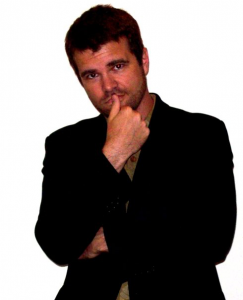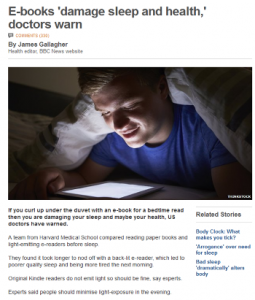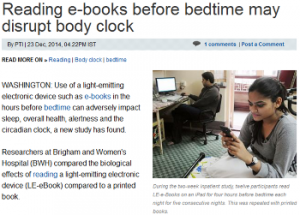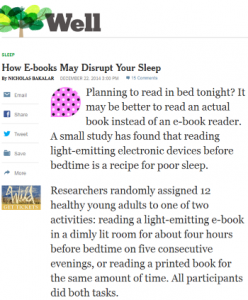 You may have heard about the recent study “proving” that reading e-books will destroy your sleep cycle.
You may have heard about the recent study “proving” that reading e-books will destroy your sleep cycle.
Well, you didn’t really, because that’s not at all what the study shows, if it in fact shows anything. What you did hear was yet another round of mindless whooping among the prejudiced, paper-loving Luddites who don’t care how much pseudoscience and misinformation they have to spread in their crusade against e-books.
To show you what I mean, below the jump are three stories about the study, including details that show that it’s not completely the fault of science journalists. The researchers themselves are corrupting science with false dilemmas, false attribution of cause, and laughably poor methodology.
 Check out the clickbait—and completely dishonest—headline on this one, from the ever-proper folks at the BBC.
Check out the clickbait—and completely dishonest—headline on this one, from the ever-proper folks at the BBC.
They eventually get around to the facts, which really have nothing to do with e-books and everything to do with too much light before bedtime.
And, without bothering to put it this way (possibly because he didn’t understand it this way) the writer exposes the irrational false dilemma presented in the study by pointing out that not all e-book readers are a problem.
The causal factor is light, which may or may not involve e-books, and not e-books, which may or may not be read on a light-emitting device.
So why blame e-books rather than light-emitting devices? Simple, backward-thinking prejudice and a lack of concern for scientific rigor.
 And, here’s yet another alarmist and completely false headline from the serious thinkers at the Economic Times of India. Again, it’s not at all about e-books. It’s about light-emitting devices.
And, here’s yet another alarmist and completely false headline from the serious thinkers at the Economic Times of India. Again, it’s not at all about e-books. It’s about light-emitting devices.
The scientific and technological illiteracy doubles down in the opening sentence, where e-books are identified as a type of “light-emitting electronic device.” E-books, of course, are not a type of device. They are files of a specific format that can be read on a variety of electronic devices, not all of which are light-emitting.
(In case you’re paying attention and notice the research location here differs from the BBC article, Brigham and Women’s is part of Harvard Med School.)
 But, for sheer biased misinformation, the New York Times takes the cake.
But, for sheer biased misinformation, the New York Times takes the cake.
Okay, at least they qualify e-book sleep disruption with “may” in the headline, but that still obscures the real cause of the problem (light-emitting devices) in an ignorant and/or biased attempt to falsely frame e-books as the culprit.
It’s that second sentence that’s the real brain-killer, though. “It may be better to read an actual book…” *facepalm*
Print fetish poseurs need to learn this basic concept: the book is the text. Bound sheets of paper are a book format, properly called a “codex” when discussed in contrast to other book formats. A book is a book whether it is presented as a scroll, or a codex, or an e-book, or an audiobook. Calling a codex an “actual book” or a “real book” only shows how ignorant you are about the history of books.
But, the real kicker is when the study’s methodology is described: “Researchers randomly assigned 12 healthy young adults…” A whole dozen?! How could they possibly manage such a massive sample size? Surely they needed a super-computer to crunch the numbers.
That’s not science, folks. It’s pseudoscience in service to ignorance and prejudice. Sure, it’s not one of the nastier and more consequential prejudices like racism or sexism, but it’s bigotry nonetheless.
Full disclosure, I much prefer paper codices to e-books. I’ve never liked an e-book for which I didn’t subsequently purchase a codex copy for my shelves. I own thousands of paper books; I tried e-books for a year or so and found I didn’t like them.
But, I’m not a codex fetishist like so many knee-jerk e-book haters today.
It would be nice if codex fetishists would just recognize their preference as being merely a preference, drop the ignorant and supremacist bigotry, and stop corrupting science while beating their war drums.

Alex Kourvo
December 24, 2014 at 8:28 pm
Well said.
My pet peeve is when people call paper books “real books.” Like ebooks aren’t real?
Paper book fetishists simply cannot stop twisting science to say what they want | J. Nelson Leith
January 8, 2015 at 3:55 pm
[…] Except that the study really showed no such thing? […]